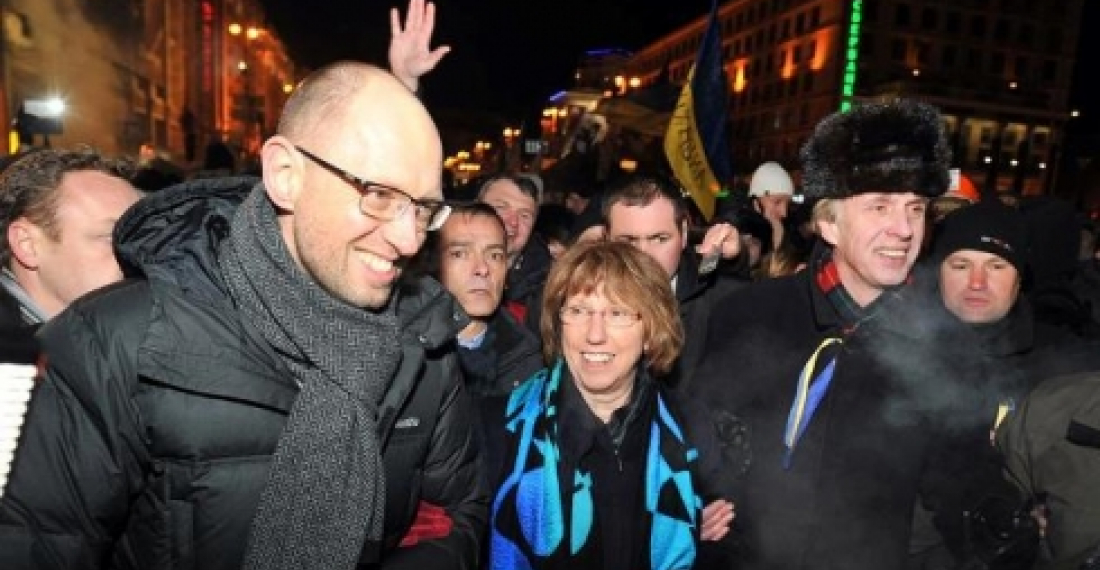The European Union and the United States have condemned in strong terms attempts by Ukrainian police overnight to break up peaceful protests that have gripped the Ukrainian Capital Kiev for the last weeks.
An unusually toughly worded statement was issued by US Secretary of State, John Kerry, as events were unfolding throughout the night. Kerry said,
"The United States expresses its disgust with the decision of Ukrainian authorities to meet the peaceful protest in Kyiv's Maidan Square with riot police, bulldozers, and batons, rather than with respect for democratic rights and human dignity. This response is neither acceptable nor does it befit a democracy.
Last week in Brussels and Moldova, I underscored publicly the importance of all sides avoiding violence and called on President Yanukovych to fulfill the aspirations of the Ukranian people. We put the government on notice about our concern.
As Vice President Biden made clear to President Yanukovych during their phone call yesterday, respect for democractic principles, including freedom of assembly, is fundamental to the United States' approach to Ukraine. This is a universal value not just an American one. For weeks, we have called on President Yanukovych and his government to listen to the voices of his people who want peace, justice and a European future. Instead, Ukraine's leaders appear tonight to have made a very different choice.
We call for utmost restraint. Human life must be protected. Ukrainian authorities bear full responsibility for the security of the Ukrainian people.
As church bells ring tonight amidst the smoke in the streets of Kyiv, the United States stands with the people of Ukraine. They deserve better."
On behalf of the European Union, Lithuania, which has the current Presidency, has issued a statement calling the Ukrainian authorities to account. The statement by Foreign Minister Linas Linkevičius said,
"Tonight's events in the Independence Square in Kiev have shown the conscious choice that the Ukrainian authorities appear to have taken against the European path, the choice which is opposite to what the President of Ukraine has been saying publicly.
Freedom of expression and right to peaceful assembly are fundamental European values and no government that claims to have taken the European path can act against them in such manner that we have been witnessing in Kiev tonight.
The actions of the police against peaceful protesters show not only disrespect to these values but also complete lack of will to engage in a meaningful dialogue with the representatives of the civil society and the opposition who have a clear vision for the European future.
The authorities have also shown publicly that they ignore the calls of the EU and US representatives, now visiting Kiev, not to take any further steps which would aggravate the situation. Actions of the authorities undermine the duties and responsibilities that Ukraine has undertaken as the Chairman in Office of the Organization of Security and Cooperation in Europe.
I repeat my call to the Ukrainian authorities stop any violent actions and provocations immediately, to investigate all cases of violence and to punish those responsible.
The Ukrainian authorities have over a short period of time, especially over this night, lost a lot of credibility. Only by taking the immediate steps to abide by the European values can they start a long way towards reestablishing trust.
We are impressed by the peaceful expression and strong spirit that we have seen in the Independence Square and trust that the European aspirations of the Ukrainian citizens will be fulfilled."
EU High Representative Catherine Ashton had earlier in the day met with the Ukrainian President Yanukovich in an attempt to find a peaceful solution to the crisis. Ashton later visited protestors on the streets of Kiev.
Commonspace.eu political editor said in a comment:
"What we are seeing now is not only an escalation in the stand-off between demonstrators and Yanukovich's security forces on the streets of Kiev, but also a much sharper reaction by the international community. If Yanukovich thought that this was a storm in a tea cup and could be cleared away and forgotten quickly it is now evident that it has turned into a major crisis. The man that everybody whether publicly or privately, is holding ultimately responsible for events in Ukraine is Russia's President Vladimir Putin, whose pressure on Yanokovich to abandon plans for an Association Agreement with the EU sparked off the protests. Putin's has always been nostalgic about the Soviet Union and his grand plan for a Eurasian Economic Union and Customs Union are seen by many in the former Soviet Republics as a thinly veiled attempt to restore it, even if devoid of the ideology of the past. Having got away with making Armenia change its choice to join in Association with the EU in September, Putin used the same heavy-handed tactics with Ukraine, unleashing a tumultuous reaction amongst the Ukrainian people, and huge resentment in Europe.
Last week at the OSCE Ministerial meeting, Russian Foreign Minister Sergei Lavrov described European reaction to events in Ukraine as hysterical. It is clear that the Russian authorities have misjudged the mood both in Ukraine and in Europe. In doing so they have done a great disservice to themselves and to Russia for much goodwill towards Russia has evaporated overnight. Mr Putin may soon realise he has a problem that he was not expecting."
The independent Ukrainian web portal and newspaper, Kyiv Post, is providing round the clock updated coverage of events in Kiev as they unfold.
source: commonspace.eu
photo: EU High Representative Catherine Ashton on the streets of the Ukrainian capital on Tuesday evening, hours before protestors were attacked by security forces provoking a sharp international reaction (picture courtesy of the European External Action Service).







